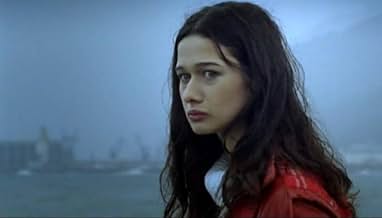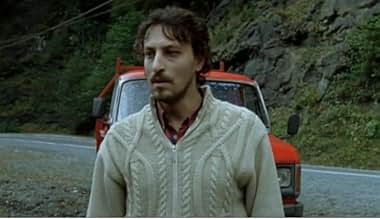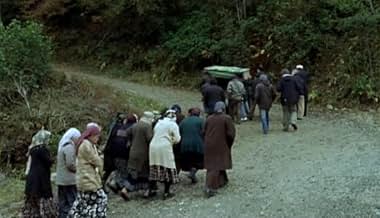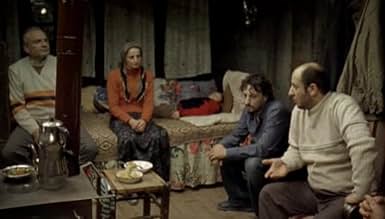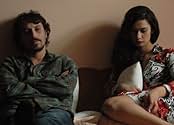Sonbahar
- 2008
- 1h 39m
IMDb RATING
7.6/10
7.3K
YOUR RATING
A man struggles after his release from ten years as a political prisoner.A man struggles after his release from ten years as a political prisoner.A man struggles after his release from ten years as a political prisoner.
- Awards
- 21 wins & 17 nominations total
- Director
- Writer
- All cast & crew
- Production, box office & more at IMDbPro
Featured reviews
Damn, it ends like a Russian novel too. The lonely silhouette against the troubled sea, the emptiness, the hopelessness, the sadness, the cold.
Another Turkish movie set in a small village in the mountains where time stood still and people live at their own pace, in stark contrast to city people. I always love seeing those houses, the interiors, the simple people, the daily chores, the mountains, the rivers, the fog, the rain, the greenery all around. These tend to be slow, contemplative movies but I wouldn't mind watching them cause it reminds me of my childhood in a sense and of simpler times.
There's nothing simple about Yusuf's situation. His ideals have been dashed, his health is shot, his life is uncertain, his future as foggy as the mornings to which he wakes up every day. He's also got some PTSD from jail and who knows what else is going on in his head. And what is the use after all. His friend Mikhail is a mirror of what his life could have been in the village. Then a woman comes into his life, cause there's always a woman in movies. But there's a lot more behind Yusuf's dark eyes. Surprisingly it's also a political movie to a small extent. But the ending is open cause how else could you end this pile-up on poor Yusuf...
Another Turkish movie set in a small village in the mountains where time stood still and people live at their own pace, in stark contrast to city people. I always love seeing those houses, the interiors, the simple people, the daily chores, the mountains, the rivers, the fog, the rain, the greenery all around. These tend to be slow, contemplative movies but I wouldn't mind watching them cause it reminds me of my childhood in a sense and of simpler times.
There's nothing simple about Yusuf's situation. His ideals have been dashed, his health is shot, his life is uncertain, his future as foggy as the mornings to which he wakes up every day. He's also got some PTSD from jail and who knows what else is going on in his head. And what is the use after all. His friend Mikhail is a mirror of what his life could have been in the village. Then a woman comes into his life, cause there's always a woman in movies. But there's a lot more behind Yusuf's dark eyes. Surprisingly it's also a political movie to a small extent. But the ending is open cause how else could you end this pile-up on poor Yusuf...
I saw this film at the San Francisco International Film Festival and the audience was ecstatic. Fans of Bela Tarr will appreciate the scenes with no dialog, but which still deliver more information than a babbling script could have delivered about a troubled political prisoner and a conflicted nation in a confused world. The cinematography, from the "central chair" in the home to the snowy mountains of northern Turkey were amazing. One issue that I wish that I had looked at before seeing the film was the history of Turkish/Russian relations. This is a major theme. In a similar vein for those of us who have read and loved the novels of Orhan Pamuk, we westerners learn something very important about a vibrant but conflicted country. I gave this 9 stars based on content first, with cinematography a very close second. The lead actor is incredible and this is a new director to be watched.
"You know, you seem like you don't live in the present. It's like you've walked off the pages of a Russian novel. Yusuf, you know what I've been thinking? I wish I could leave everything behind and set off on a long journey with you."
Another piece of wonderful minimalist cinema (i'm nothing if not consistent) this time from a Turkish filmmaker making his debut feature. Yusuf, a political prisoner, is released from jail on health grounds and returns to the tiny village community he grew up in.
As you might expect from that premise this is a film with a political message which is at times forced upon the viewer, a distraction from the contemplative mood of the piece as Yusuf comes to terms with everything he gave up for his ideals, his new found freedom, his mortality and his struggle to reintegrate with village life.
Packed with beautiful vistas and long moody takes without dialogue it is the use of ambient noise, or at times a lack of, that most impressed and so the occasionally invasive use of melodramatic music only served to irritate rather than accentuate the moment.
The sub story of his connection with a young boy and a prostitute are pretty standard narrative devices but never feel arbitrary, which in itself is impressive but the emotional arc they guide you through places them as some of the more impressive uses of the trope I have seen.
Quality low budget world cinema from a strong new voice worth keeping an eye on.
Another piece of wonderful minimalist cinema (i'm nothing if not consistent) this time from a Turkish filmmaker making his debut feature. Yusuf, a political prisoner, is released from jail on health grounds and returns to the tiny village community he grew up in.
As you might expect from that premise this is a film with a political message which is at times forced upon the viewer, a distraction from the contemplative mood of the piece as Yusuf comes to terms with everything he gave up for his ideals, his new found freedom, his mortality and his struggle to reintegrate with village life.
Packed with beautiful vistas and long moody takes without dialogue it is the use of ambient noise, or at times a lack of, that most impressed and so the occasionally invasive use of melodramatic music only served to irritate rather than accentuate the moment.
The sub story of his connection with a young boy and a prostitute are pretty standard narrative devices but never feel arbitrary, which in itself is impressive but the emotional arc they guide you through places them as some of the more impressive uses of the trope I have seen.
Quality low budget world cinema from a strong new voice worth keeping an eye on.
The characters are clearly under-developed, it would've added more depth to the film if there were more conversations, decent ones, and if the stimulating of the memories of prison wasn't through news materials. For more over all the film was a satisfying experience and I'm giving it 9 mainly for the great cinematography.
Sonbahar represents a realm that metaphorically speaking belongs to silence. Yousuf seems to have that depth with which he can journey from speech to whisper to silence.This film took sadness to a height what I have rarely witnessed in films. The Russian hooker, who is a very young mother too, says to Yousuf, "You know, you seem like you don't live in the present. ... It's like you've walked off the pages of a Russian novel." Exactly that is the point. Everything is past for Yousuf -- even his sadness too -- which is now blank because, as Michail says, everything has gone -- even socialism. Now their girls become hookers. Yousuf remains in the past, he is past everything -- even pains and all. The young boy whom he tries to teach rejects him too. All the memories of university jail and all come like scattered pictures. And that exactly is the depth of blankness depicted in this film. The sad hooker goes away. Only waves rise and fall -- rise and fall -- and everything ends with a death -- a procession of death walking through the valleys.
And one thing to say, the eaarlier review by 'eray-basma' mentioned that Sonbahar tries to be like Tarkovsky. I do not know why she/he said it. But, on my part I can say, for more than the last four decades Tarkovsky is like a god to me, both Tarkovsky and his poet father are like a milestone to me in human culture. But not a single time I remembered him during the movie. When it is only sadness and sadness -- the sadness becomes blank and all pervading. Sonbahar is that. Salute to the director.
Did you know
- TriviaYusuf and his mother speak in Homshetsi with each other- a dialect primarily spoken in Turkey's Black Sea region and South Caucasus, blending in elements of Turkish and Armenian.
- ConnectionsFeatures Oncle Vania (1970)
- How long is Autumn?Powered by Alexa
Details
Box office
- Gross worldwide
- $741,768
Contribute to this page
Suggest an edit or add missing content



